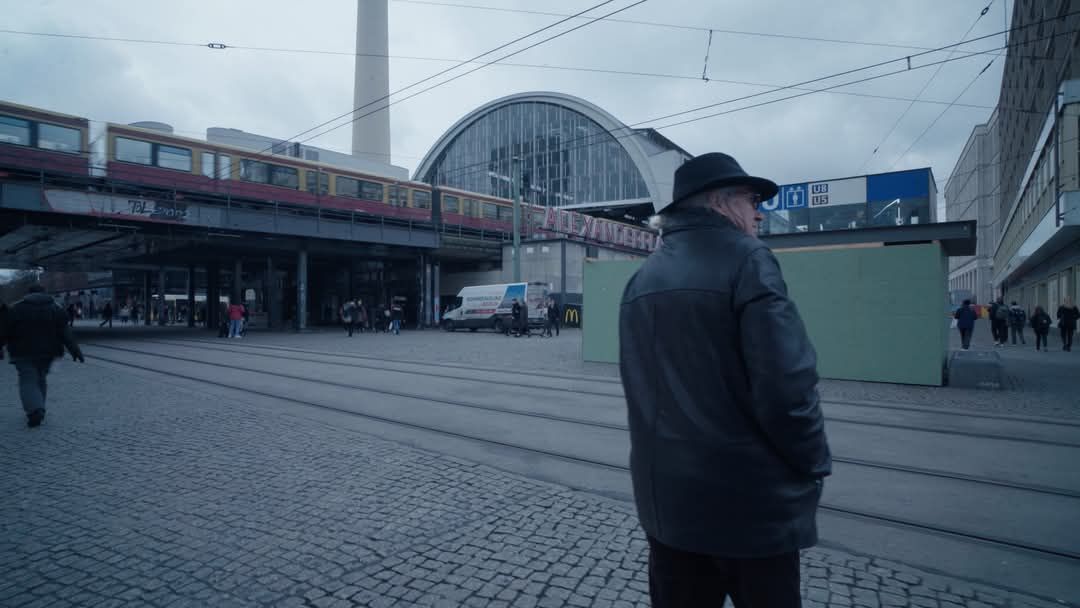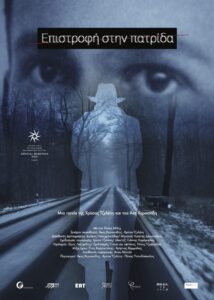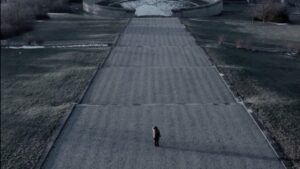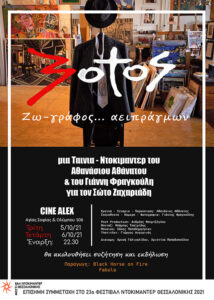RETURN TO HOMELAND
Απρ 09, 2025 Κινηματογράφος 0

MOVIE REVIEW
THE SEARCH FOR IDENTITY
Return to homeland: written by Giannis Fragoulis
Titus Milech was born in 1947 in Tibingen. At an early age he left his homeland and settled in France, took French citizenship, stopped speaking German and did his utmost to renounce the Germanness he carried as a weight on his conscience. The crimes of Nazism and his family’s Nazi past was something that weighed heavily on him and he decided to distance himself from anything that reminded him of it.
Return to homeland: The movie
His family members may not have been members of the Nazi party but they supported the Nazis and believed in their “vision” of a greater Germany. Having lived in France for 30 years, in 2000 and 2001 he decided to travel to Germany, wanting to see the past more clearly. He wanted to see where he came from, “the country of his childhood, which was characterised more by sadness and confusion than by joy”.
The film introduces us to Titus Millech, a German psychiatrist and psychoanalyst. It gives him a reason to explain why he left Germany and erased what was German in his conscience. We follow the German scientist as he tries to understand what Germany is to him. After many years he has the ability to look at these issues more objectively to provide some answers. From the beginning of the film the question is posed: is it possible to make this search, this journey to the core of the trauma?
Return to homeland: The trauma
An important point of the film is his mother. It is mentioned that she punished him in a violent way, beating him, reminding him, later on, of the Nazis’ way of imposing physical violence. So we have here a childhood trauma. It’s remarkable that he doesn’t talk about the father. Apparently his father had not dealt with the child’s “compliance” issues. So the young child had a hard time finding a person to explain to him sober. It is still obvious that his oedipus was unfulfilled.

Later, when he learned about Nazism, he turned his back on his homeland. He essentially shook off his mother’s harsh attitude. For him, Germanness had become associated with the mother. This was an attempt to soothe the childhood trauma. We know very well that this is impossible to do with such a move except by deep psychoanalysis that gets to the core of the issue, finds the missing phallus and answers the question -what is it?-, issues that are fundamental to Freudian and post-Freudian psychoanalytic theory.
Return to homeland: The return
Titus Milleh goes to France. He marries, for the second time, a Jewish woman. He has a child with her. It is another attempt to reach the traumatic area of his psyche and soothe the trauma. Further ahead he has made a short wander through various countries, including Greece. It is obvious that he is using the experiential wandering to get into the traumatic area of his psyche. After many years he has settled permanently in Greece. We can see that this wandering focuses on countries affected by Nazism and, presumably, on persons associated with Nazi atrocities. He tries to see his trauma through the mirror, but this is impossible, as Jacques Lacan says.
The time to go into the wound has come. He must go to his birthplace. He must find the places and people who will help him do his analysis. He should return to Germany and, aided by this experience, build his own Germany. The lens follows him as an observer would. It records his speech and attitudes. It goes deeper and deeper into this corpus of unconscious acts that, more and more, become conscious as the film time progresses.

Return to homeland: The camera
The film uses cinematic tools to focus on the object of its study, Titus Milech. The camera sometimes sees him from a distance and when his behavior is signified, it focuses on him in medium or close-up shots. The viewer identifies with the film lens, the subjective shots prompt us to observe this man and study him. Because this is difficult to do in one viewing, the viewer is pushed to collect all the data, store it in his unconscious and, later, after the viewing, make his own story about this German who has renounced his homeland.
As the filmic text evolves, we see that the object of study shifts. This spatial shift leads us to the vast field that is Germany, Germanness, Nazism, absolutism, violence. It is possible to replace “Germany” and “Germanness” and put in their place another country and another nationality, even our own. Then we understand that the field of study of the film is not Titus Milech and his trauma, but every person facing such a problem.
Return to homeland:The structure
According to Wilhelm Reich, in order to fight fascism we have to get the fascist out of ourselves. A strong aggression to a fascist or pro-fascist has elements of fascism. Speech, explanation, research will help us see the core of the issue and fight the theoretical core of fascism. In this matter this film helps us a lot. The viewer is often moved because he sees his own trauma in the collective trauma. But this is not something the film seeks to do. It is something that comes out spontaneously.
The structure of the film has been done in the editing room. This has created the rhythm that structures the elements, lists them and combines them so that what is born from these microstructures can be seen. Ideological editing, according to Eisenstein, finds its ultimate application here. We don’t know if Titus Milech has reached the core of his trauma. What we are now interested in is that we can embark on a similar journey by taking impetus from the filmic text of this film. And that is the essence of cinema.
RETURN TO HOMELAND
Directed by. Chrysa Tzelepi, Akis Kersanidis
Screenwriter: Chrysa Tzelepi, Akis Kersanidis
Photo: Drakos Polychroniadis
Editing: Yannis Karabelas
Music: Kostis Drygiannakis
Sound: Simon Lazaridis
Producers: Panos Papadopoulos, Chrysa Tzelepi, Akis Kersanidis
Production country: Greece
Language: greek, english, german, french
Production year: 2024
Genre: documentary
Duration: 125΄
Contact: anemicinema.lab@gmail.com
For more information on the participiants and technical characteristics, see here.
Read the movie reviews we have published
No another land (Kallitsa Vlahou)
No another Land (Giannis Fragoulis)
Σχετικά άρθρα
-
 EN FANFARE
EN FANFAREΑπρ 12, 2025 0
-

-
 GIANNIS IN THE CITIES
GIANNIS IN THE CITIESΜαρ 01, 2025 0
-

Στην ίδια κατηγορία
-
 ΤΟ ΚΑΤΑ ΜΑΤΘΑΙΟΝ...
ΤΟ ΚΑΤΑ ΜΑΤΘΑΙΟΝ...Απρ 11, 2025 0
-
 ΓΙΑΝΝΗΣ ΣΠΑΝΟΣ
ΓΙΑΝΝΗΣ ΣΠΑΝΟΣΑπρ 08, 2025 0
-
 Η ΟΡΧΗΣΤΡΑ ΤΟΥ...
Η ΟΡΧΗΣΤΡΑ ΤΟΥ...Απρ 07, 2025 0
-

Αναζήτηση
-
 WONDER WOMAN
WONDER WOMANΙούν 09, 2017 138
-
 ΠΑΙΔΙΚΗ ΣΚΗΝΗ
ΠΑΙΔΙΚΗ ΣΚΗΝΗΟκτ 12, 2014 2
-
 ΚΛΗΡΩΣΗ ΠΡΟΣΚΛΗΣΕΩΝ
ΚΛΗΡΩΣΗ ΠΡΟΣΚΛΗΣΕΩΝΜαρ 22, 2014 2
-
 ΔΥΟ ΜΕΡΕΣ, ΜΙΑ ΝΥΧΤΑ
ΔΥΟ ΜΕΡΕΣ, ΜΙΑ ΝΥΧΤΑΝοέ 13, 2014 2
-
 ΑΧΙΛΛΕΑΣ ΨΑΛΤΟΠΟΥΛΟΣ
ΑΧΙΛΛΕΑΣ ΨΑΛΤΟΠΟΥΛΟΣΝοέ 09, 2014 2
-
 ISTABUL FILM FESTIVAL
ISTABUL FILM FESTIVALΜαρ 08, 2014 2
-
 EN FANFARE
EN FANFAREΑπρ 12, 2025 0
-
 ΤΟ ΚΑΤΑ ΜΑΤΘΑΙΟΝ ΕΥΑΓΓΕΛΙΟ
ΤΟ ΚΑΤΑ ΜΑΤΘΑΙΟΝ ΕΥΑΓΓΕΛΙΟΑπρ 11, 2025 0
-
 RETURN TO HOMELAND
RETURN TO HOMELANDΑπρ 09, 2025 0
-
 ΓΙΑΝΝΗΣ ΣΠΑΝΟΣ
ΓΙΑΝΝΗΣ ΣΠΑΝΟΣΑπρ 08, 2025 0
-
 Η ΟΡΧΗΣΤΡΑ ΤΟΥ ΑΔΕΛΦΟΥ ΜΟΥ
Η ΟΡΧΗΣΤΡΑ ΤΟΥ ΑΔΕΛΦΟΥ ΜΟΥΑπρ 07, 2025 0
-


Δείτε το τρέιλερ της ταινίας μας, που συμμετέχει το Φεστιβάλ Ντοκιμαντέρ Θεσσαλονίκης.
SOTOS, EVERLASTING PAINTER (TRAILER)
Youtube
Επικοινωνήστε
ΓΙΑΝΝΗΣ ΦΡΑΓΚΟΥΛΗΣ
Email: info@filmandtheater.gr
Τηλ: (+30) 6974123481
Διεύθυνση: Ιωαννίνων 2, 56430, Σταυρούπολη Θεσσαλονίκη
![]()

